2013版初中英语全程复习方略课件(教材复习案)八年级下册 Units 7、8(人教版)(共50张PPT)
文档属性
| 名称 | 2013版初中英语全程复习方略课件(教材复习案)八年级下册 Units 7、8(人教版)(共50张PPT) |
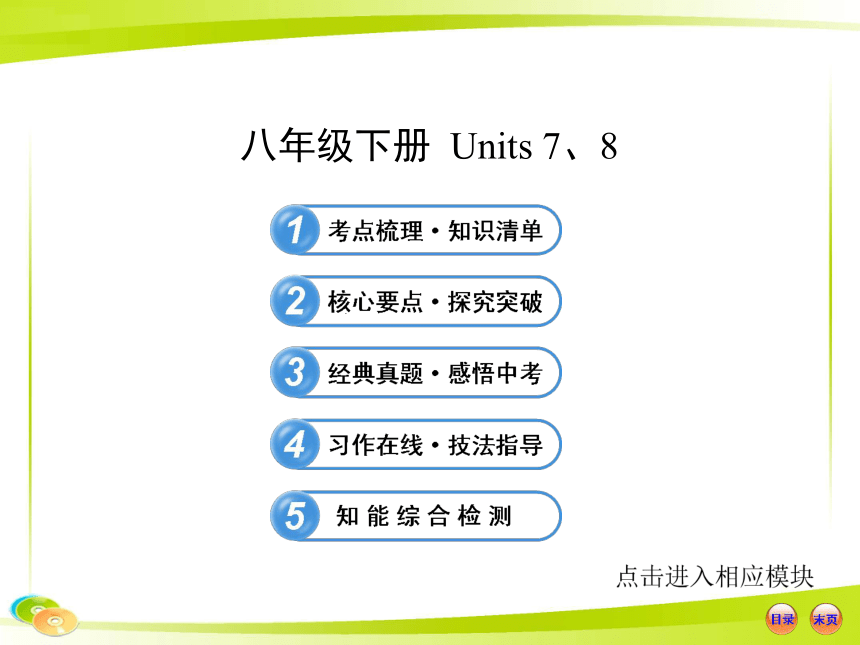
|
|
| 格式 | zip | ||
| 文件大小 | 1.2MB | ||
| 资源类型 | 教案 | ||
| 版本资源 | 人教新目标(Go for it)版 | ||
| 科目 | 英语 | ||
| 更新时间 | 2014-03-06 00:00:00 | ||
图片预览

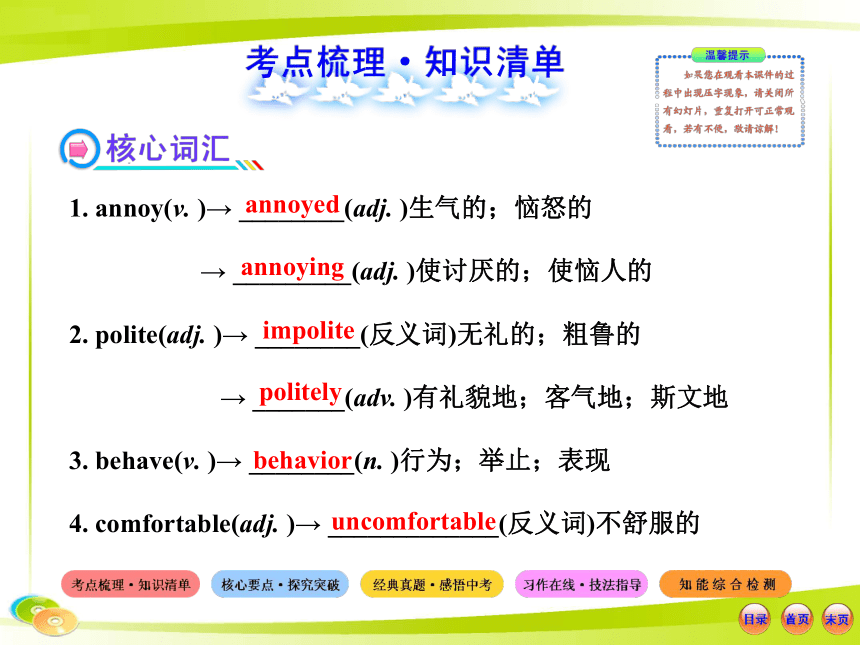
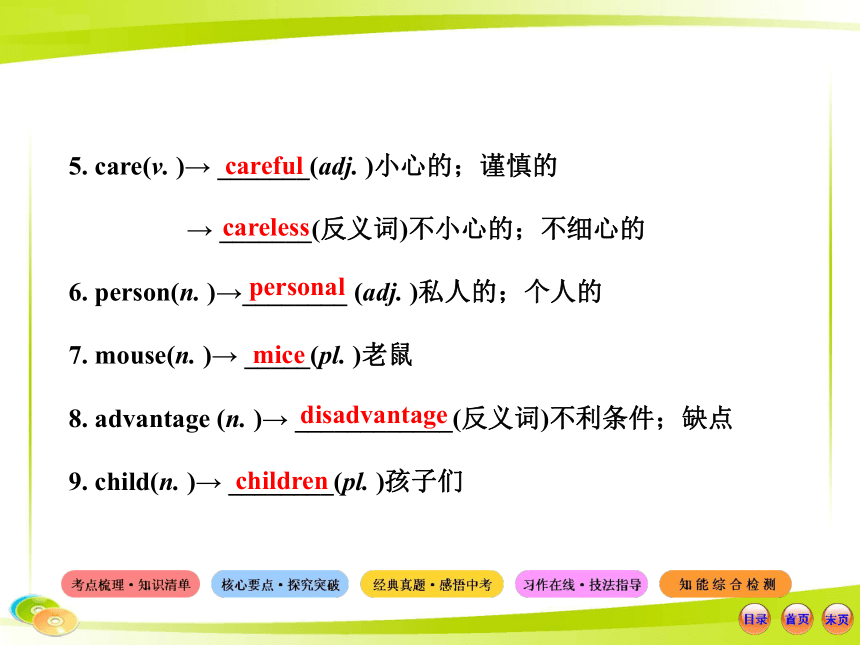
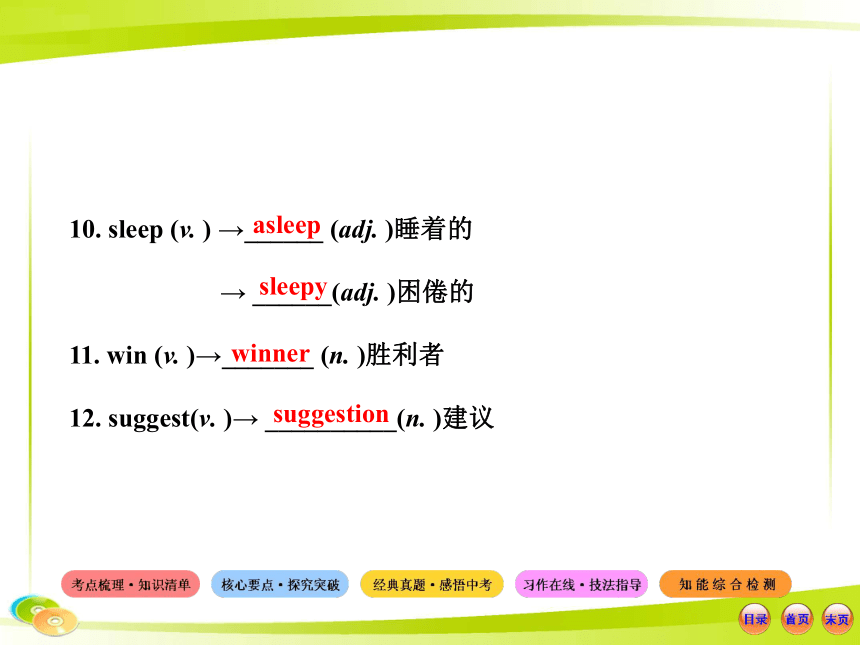
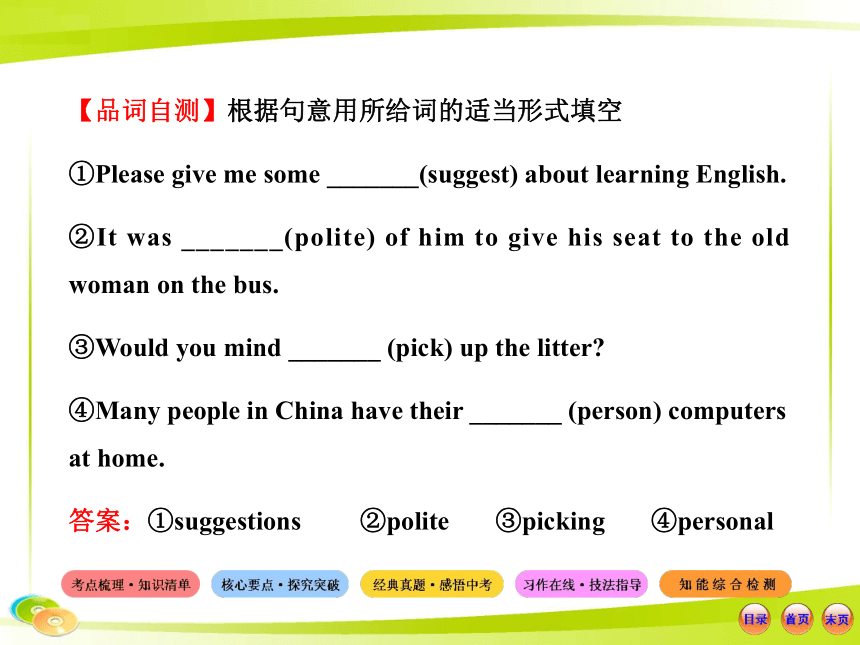
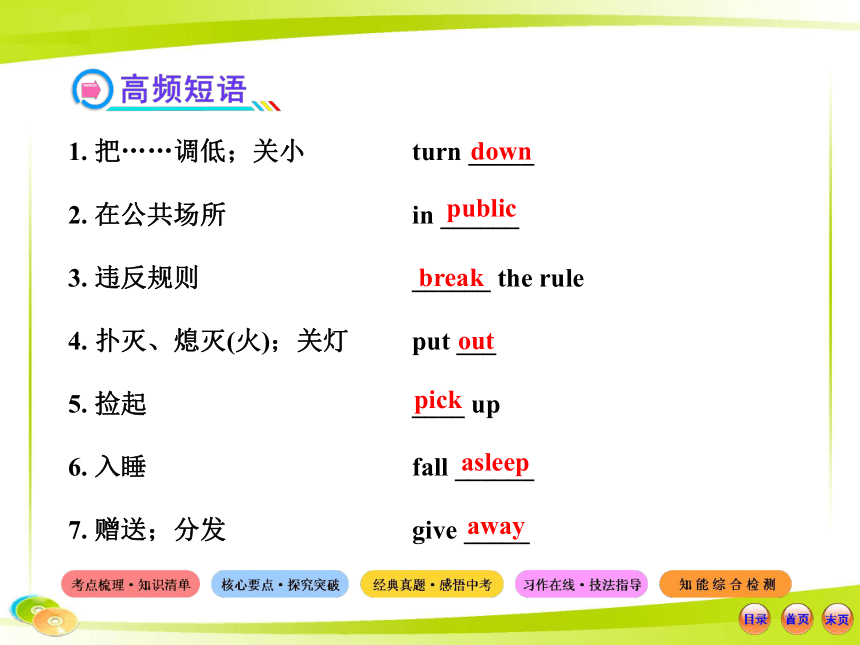
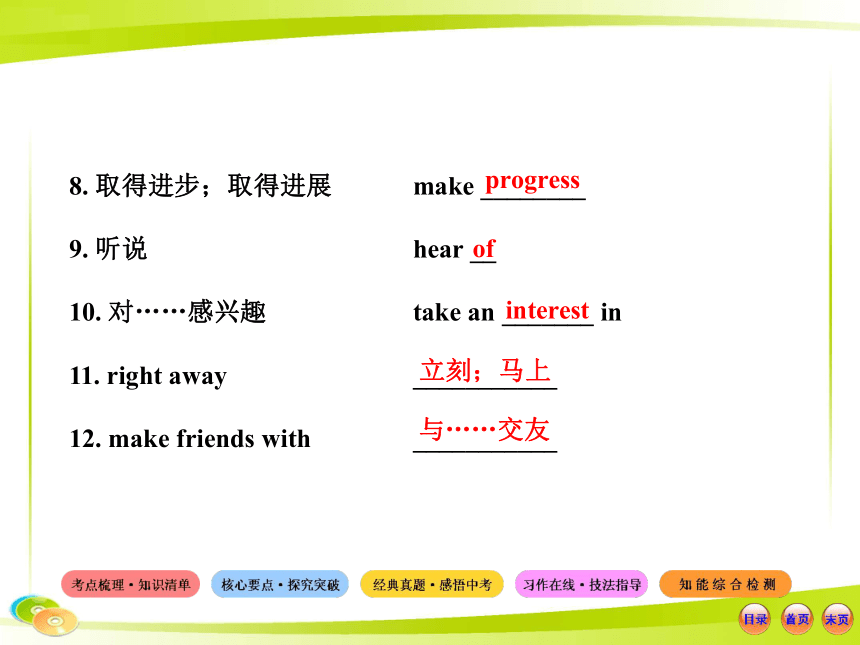
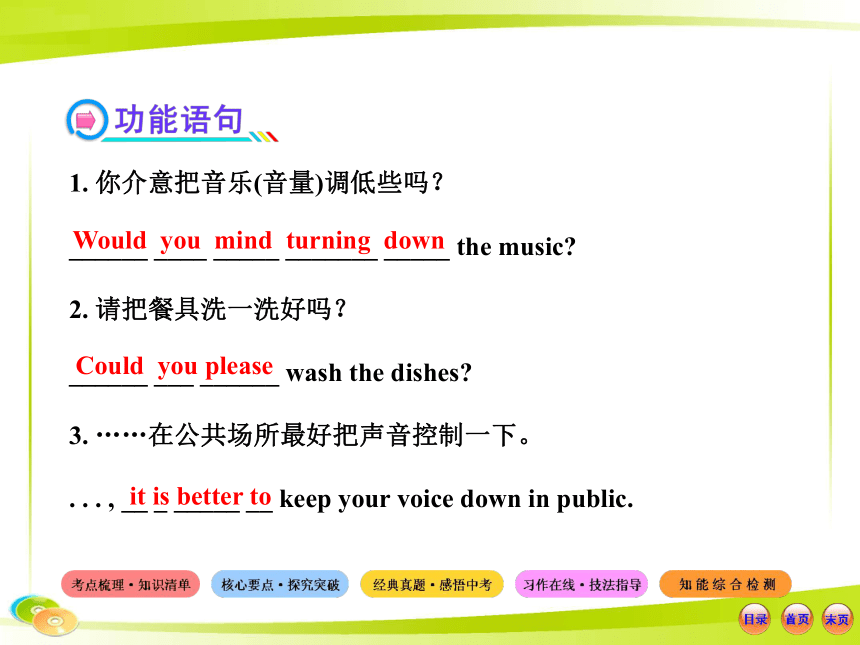
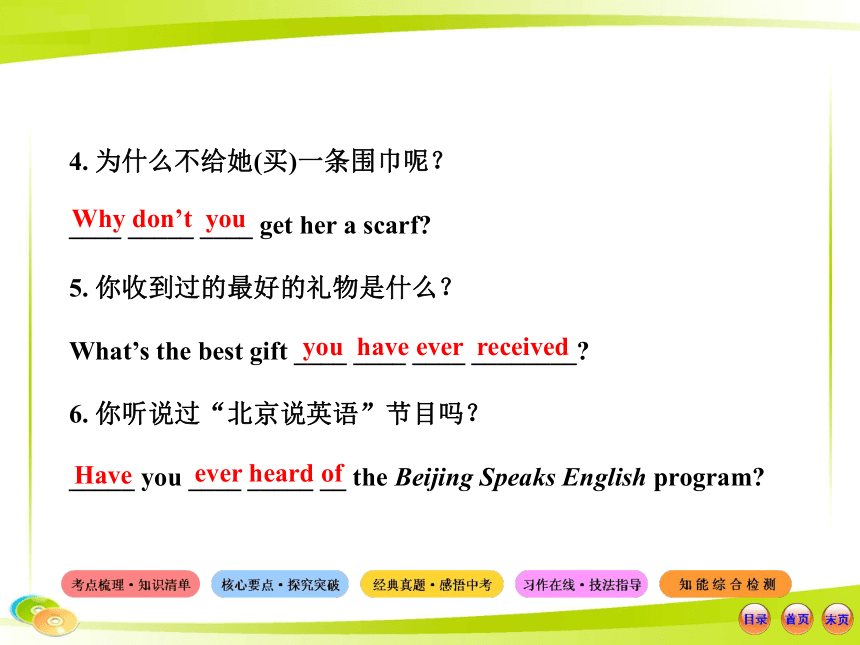
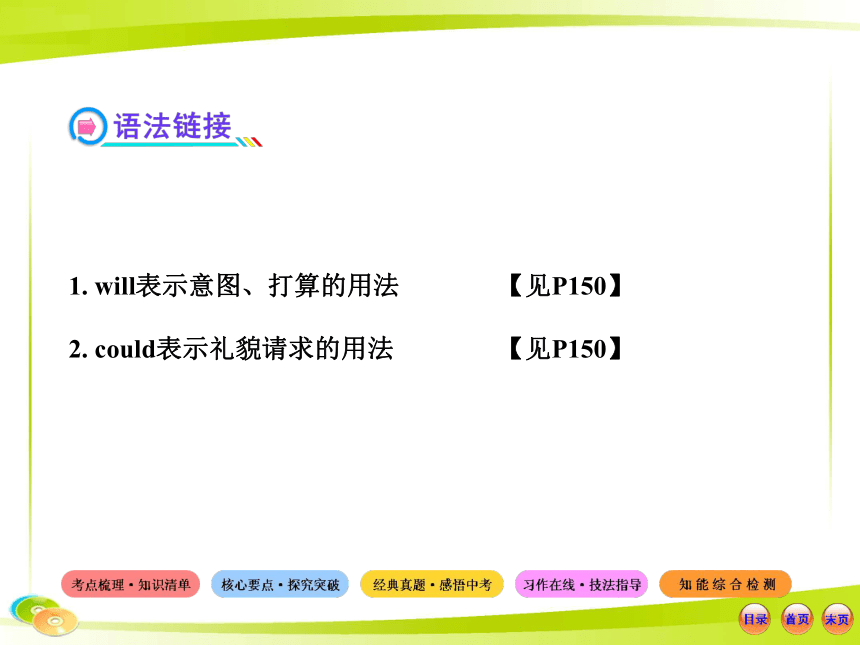
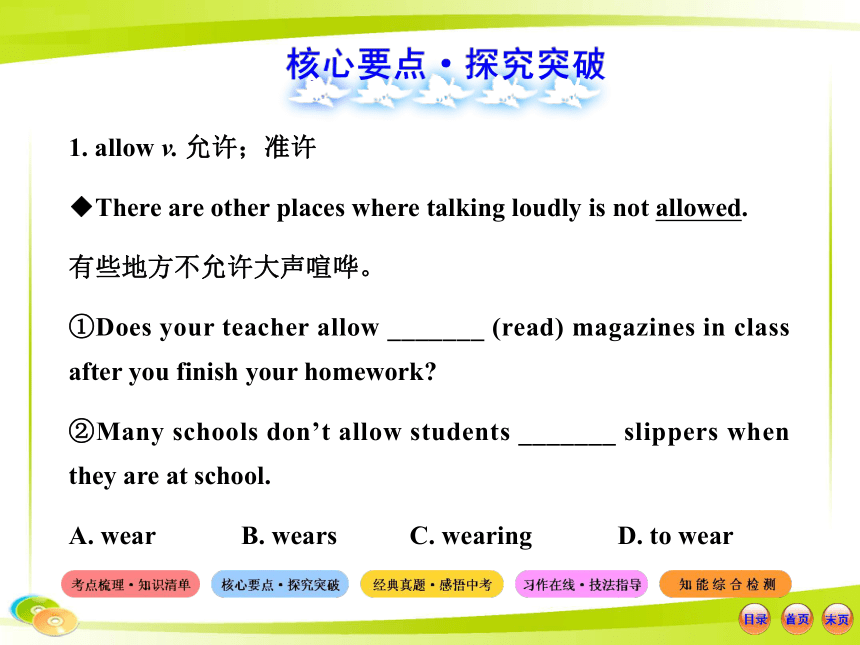
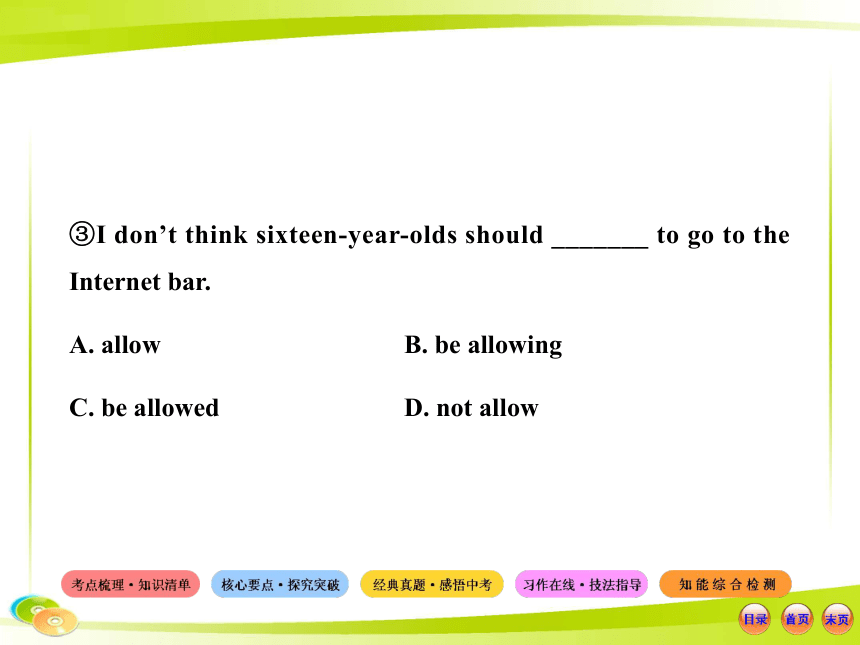
文档简介
(共50张PPT)
八年级下册 Units 7、8
1. annoy(v. )→ ________(adj. )生气的;恼怒的
→ _________(adj. )使讨厌的;使恼人的
2. polite(adj. )→ ________(反义词)无礼的;粗鲁的
→ _______(adv. )有礼貌地;客气地;斯文地
3. behave(v. )→ ________(n. )行为;举止;表现
4. comfortable(adj. )→ _____________(反义词)不舒服的
annoyed
annoying
impolite
politely
behavior
uncomfortable
5. care(v. )→ _______(adj. )小心的;谨慎的
→ _______(反义词)不小心的;不细心的
6. person(n. )→________ (adj. )私人的;个人的
7. mouse(n. )→ _____(pl. )老鼠
8. advantage (n. )→ ____________(反义词)不利条件;缺点
9. child(n. )→ ________(pl. )孩子们
careful
careless
personal
mice
disadvantage
children
10. sleep (v. ) →______ (adj. )睡着的
→ ______(adj. )困倦的
11. win (v. )→_______ (n. )胜利者
12. suggest(v. )→ __________(n. )建议
asleep
sleepy
winner
suggestion
【品词自测】根据句意用所给词的适当形式填空
①Please give me some _______(suggest) about learning English.
②It was _______(polite) of him to give his seat to the old woman on the bus.
③Would you mind _______ (pick) up the litter
④Many people in China have their _______ (person) computers at home.
答案:①suggestions ②polite ③picking ④personal
1. 把……调低;关小 turn _____
2. 在公共场所 in ______
3. 违反规则 ______ the rule
4. 扑灭、熄灭(火);关灯 put ___
5. 捡起 ____ up
6. 入睡 fall ______
7. 赠送;分发 give _____
down
public
break
out
pick
asleep
away
8. 取得进步;取得进展 make ________
9. 听说 hear __
10. 对……感兴趣 take an _______ in
11. right away ___________
12. make friends with ___________
progress
of
interest
立刻;马上
与……交友
1. 你介意把音乐(音量)调低些吗?
______ ____ _____ _______ _____ the music
2. 请把餐具洗一洗好吗?
______ ___ ______ wash the dishes
3. ……在公共场所最好把声音控制一下。
. . . , __ _ _____ __ keep your voice down in public.
Would you mind turning down
Could you please
it is better to
4. 为什么不给她(买)一条围巾呢?
____ _____ ____ get her a scarf
5. 你收到过的最好的礼物是什么?
What’s the best gift ____ ____ ____ ________
6. 你听说过“北京说英语”节目吗?
_____ you ____ _____ __ the Beijing Speaks English program
Why don’t you
you have ever received
Have
ever heard of
1. will表示意图、打算的用法 【见P150】
2. could表示礼貌请求的用法 【见P150】
1. allow v. 允许;准许
◆There are other places where talking loudly is not allowed.
有些地方不允许大声喧哗。
①Does your teacher allow _______ (read) magazines in class after you finish your homework
②Many schools don’t allow students _______ slippers when they are at school.
A. wear B. wears C. wearing D. to wear
③I don’t think sixteen-year-olds should _______ to go to the Internet bar.
A. allow B. be allowing
C. be allowed D. not allow
【自主归纳】allow用法小结:
(1)allow后接名词或动名词作宾语,即allow doing sth. 允许做
某事。
(2)allow后接不定式作宾语补足语,即allow sb. _____ sth. 允许
某人做某事。
(3)be (not) allowed to do sth. (不)被允许做某事,allow用于被
动语态。
to do
【判断抢答】判断下面句子翻译正误
蒂娜的父母对她要求很严格,他们不允许她在外面待到很晚。
①Tina’s parents are strict with her and they don’t allow her
stay out late. ( )
②Tina’s parents are strict with her and they don’t allow her to
stay out late. ( )
答案:①reading ②D ③C
×
√
2. instead adv. 代替;而不是
◆People don’t need to spend too much money. Instead, making a meal is enough.
人们不需要花费太多钱。反之,一顿饭足矣。
①—We are free this afternoon. Let’s go to play computer games.
—Well, I think we’d better watch an English program _______.
A. instead B. instead of
C. either D. too
②Last Sunday we didn’t go to the beach. We went to the cinema instead. (改为同义句)
Last Sunday we went to the cinema _______ _______ going to the beach.
【自主归纳】instead用法小结:
(1)instead副词,可单独用于句首或句末,位于句首时,后用逗号与句子隔开。
(2)instead of “代替……;而不是……”,是介词短语,后接名词、代词或动名词作宾语;其同义词组是rather than,但rather than后一般跟动词原形。
答案:①A ②instead of
3. turn down关小;调低
◆Would you mind turning down the music
你介意把音乐声调低些吗?
①Mike _______ his computer and checked his e-mail.
A. turned on B. turned off
C. turned up D. turned down
②—The music is too noisy, Mum. I’m doing my homework.
—Sorry, Lucy. I’ll _______ at once.
A. turn it up B. turn it on
C. turn it down D. turn down it
【自主归纳】
__________意为“调低;关
小”,其反义词组为turn up
调大;其宾语若为名词,
位于down/up前后均可;
若为代词,则必须放在两词
之间
turn down
turn down the music
turn the music down
turn it down
答案:①A ②C
_______意为“打开,旋开(自
来水、电灯、煤气、无线电
等)”,其反义词组为turn off
关掉,其后跟宾语的用法
同turn down/ up
turn on
the light
turn on the light
turn ___ ____ on
turn __ on
it
4. Would you mind turning down the music
你介意把音乐声调低些吗?
①Would you mind _______(turn)on the TV now It’s time for news.
②Would you mind wearing that old hat (改为否定句)
Would you mind _______ _______ that old hat
③—Would you mind putting out your cigarette It’s not allowed to smoke here in the room.
—_______ I’ll put it out right away.
A. Sure. B. Certainly.
C. Of course I don’t. D. Not at all.
【自主归纳】Would you mind doing sth. ?的用法:
(1)Would you mind doing sth. ?常用于委婉地提出请求,意为“你介意做……吗?/请你做……好吗?”,其否定形式是在doing之前加not,意为“请你不做……好吗?/你介意不……吗?”。
(2)常见答语:
表示不介意:Not at all. /Certainly not. /Of course not. ;
表示介意:Sorry. /I’m sorry. 等,然后陈述理由。
答案:①turning ②not wearing ③D
Ⅰ. 根据句意及首字母或汉语提示完成单词
1. (2012·济宁中考)It’s good manners to keep your _______(声音)down in public.
2. (2012·湖州中考)I think Julie will be the _______ (胜利者)of the English competition in our school.
3. (2012·安徽中考)It’s p_______ (礼貌)to use quiet voices in the library.
答案:1. voice 2. winner 3. polite
4. (2011·滨州中考)Last year we went to Egypt, but this summer we are going to visit an _______ (亚洲的) country.
5. (2011·包头中考)I haven’t _______ (收到)a letter from my brother yet.
6. (2011·南通中考)Peter’s dream is to _______ (进入) a medical college in the future.
答案:4. Asian 5. received 6. enter
7. (2011·广安中考)My English teacher always _______ (鼓励) me to speak more English in class.
8. (2011·黄冈中考) _______(除了……之外) Su Dongpo, Huanggang was home to ancient doctor Li Shizhen and printing inventor Bi Sheng.
答案:7. encourages 8. Besides
Ⅱ. 用所给词的适当形式填空
1. (2012·临沂中考)Be _______(care)when you cross the street.
2. (2012·兰州中考)The movie was interesting, but Grace was not _______ (interest) in it.
3. (2012·兰州中考)Thanks to your _______ (suggest), I got to complete the job in time.
4. (2011·南京中考)It’s _______ (polite)to ask a lady about her age in western countries.
答案:1. careful 2. interested 3. suggestions 4. impolite
Ⅲ. 单项选择
1. (2012·临沂中考)It _______ Mr Green an hour to fix up his bicycle yesterday.
A. cost B. paid C. spent D. took
【解析】选D。由句中“an hour”可知,应用take或spend,且主语为it,故选D项。
2. (2012·无锡中考)The _______ action film has attracted millions of young people to the cinema.
A. 130-minute B. 130-minutes
C. 130 minute D. 130 minutes
【解析】选A。复合定语由连字符连接,名词用单数形式。
3. (2012·潍坊中考)Girl students in some schools are not allowed _______ long hair.
A. having B. have
C. had D. to have
【解析】选D。allow sb. to do sth. 允许某人做某事。
4. (2012·无锡中考)My father doesn’t like shopping much. He would rather _______ TV at home than _______ around for hours in shops.
A. watch; walk B. watch; to walk
C. to watch; to walk D. to watch; walk
【解析】选A。would rather do sth. than do sth. 宁愿做某事而不愿做某事。
5. (2011·河源中考)—Would you mind opening the window
—_______. It’s very hot and wet in the room.
A. Of course B. Not at all
C. That’s all right D. You’re welcome
【解析】选B。由答语“房间里又热又潮湿。”可知应用表示不介意的回答,故用Not at all. 。
6. (2011·葫芦岛中考) My teacher encouraged me _______ more confident.
A. am B. is C. be D. to be
【解析】选D。encourage sb. to do/be鼓励某人……,confident是形容词,故选D项。
7. (2011·岳阳中考)—The girl _______ all her pocket money to the people in the southwest for the serious drought(旱灾).
—What a good girl!
A. took away B. gave up
C. gave away
【解析】选C。take away带走, 拿走;give up放弃;give away赠送; 分发。前句句意:这个女孩把她的所有的零用钱捐给了西南干旱地区的人们。
8. (2011·德阳中考) Stop making so much _______. The children are sleeping.
A. voice B. noise C. sound
【解析】选B。voice指人发出的声音,如说话声、唱歌声;noise指不悦耳的声音,如噪音、杂音、吵闹声等;sound泛指一切可听到的声音。句意:停止制造这么大的噪音。孩子们正在睡觉。故选B项。
Ⅳ. 完成句子
1. (2012·滨州中考)晚饭后为什么不出去散步?
__________ go out for a walk after supper
2. (2012·烟台中考)这部电影太乏味了,以至于我看到一半就睡着了。
The movie was so boring that I _______ _______ half way through it.
答案:1. Why not/Why don’t you 2. fell asleep
3. (2011·本溪中考)在公共场所不要大声说话。
Don’t talk loudly _______ _______.
4. (2011·遂宁中考)在中国不允许十六岁的青少年驾驶。
Sixteen-year-olds shouldn’t _______ _______ to drive in China.
5. (2011·乐山中考)Shall we have a picnic at the weekend (改为同义句)
_______ _______ having a picnic at the weekend
答案:3. in public 4. be allowed 5. What/ How about
“建议”是初中英语交际功能之一,也是各地中考命题的热点。在英语中,有很多句式都可以表达这一意思,有直接建议、委婉建议、责备建议、劝告建议等,其中以学校生活、社会生活为背景让学生提出合理建议进行设题最为常见。在写作此类话题作文过程中要特别注意:1. 提出请求。2. 阐述原因。3. 陈述观点。
【典题示例】
(2011·桂林中考)
今年是桂林市创建全国文明城市关键的一年。“桂林是我家,创城靠大家!”作为中学生,我们应该积极参与。请根据以下提示,写一篇80词左右的短文(开头已给出,不计入总词数)。
要点:
(1)尊敬老师,对人礼貌。
(2)帮助他人,友善待人。
(3)遵守交规,过马路走斑马线,不闯红灯。
(4)保护环境,不乱扔垃圾,不踩草地等。
(5)补充两句个人观点。
参考词汇:respect(尊敬);be polite to; obey(遵守);traffic rules; zebra crossing(斑马线)
要求:
(1)内容应包括所提供的信息及要点,可适当发挥,但不要逐条翻译;
(2)不得透露学校、姓名及任何个人信息。
Guilin is now making its effort to become a national civilized city. As students, what should we do
_________________________________________________________________________________________________________________________________________________________________
【审题谋篇】
1. 本篇是表达建议的文章,首先要开门见山地交代请求;其次需要陈述自己的理由; 最后再次陈述自己的观点来结束文章。在文章中要清楚地表达自己的感受并委婉、礼貌地提出要求和建议。
2. 人称:第一人称。
3. 主要时态:一般现在时。
4. 高分模板:
【佳作诵读】
Guilin is now making its effort to become a national civilized city. As students, what should we do
We must respect our teachers and be polite to others. We should also help those who are in need and be friendly to the people around us. Besides, we must obey the traffic rules. When crossing the streets, we should walk on the zebra crossing. And we mustn’t go across the street when the traffic lights are red. What’s more, we should protect our environment. For example, we mustn’t step on the grass and climb trees. Litter mustn’t be thrown everywhere.
Guilin is our hometown. I think it’s better for everyone in our city to try to make it a civilized city.
【名师点睛】
(1)本文叙述完整,语句连贯通顺,并注意将题干提供的信息加以合理地整合,结构清晰,表达准确。
(2)文中besides, what’s more, for example的运用,使句式更灵活;用what should we do提出请求,态度恳切;巧妙地运用了We must/mustn’t. . . ,We should. . . 句式,使责任建议和劝告建议有机地结合;文中最后一句堪称点睛之笔,表达了作者的观点,使主题得到了升华。
八年级下册 Units 7、8
1. annoy(v. )→ ________(adj. )生气的;恼怒的
→ _________(adj. )使讨厌的;使恼人的
2. polite(adj. )→ ________(反义词)无礼的;粗鲁的
→ _______(adv. )有礼貌地;客气地;斯文地
3. behave(v. )→ ________(n. )行为;举止;表现
4. comfortable(adj. )→ _____________(反义词)不舒服的
annoyed
annoying
impolite
politely
behavior
uncomfortable
5. care(v. )→ _______(adj. )小心的;谨慎的
→ _______(反义词)不小心的;不细心的
6. person(n. )→________ (adj. )私人的;个人的
7. mouse(n. )→ _____(pl. )老鼠
8. advantage (n. )→ ____________(反义词)不利条件;缺点
9. child(n. )→ ________(pl. )孩子们
careful
careless
personal
mice
disadvantage
children
10. sleep (v. ) →______ (adj. )睡着的
→ ______(adj. )困倦的
11. win (v. )→_______ (n. )胜利者
12. suggest(v. )→ __________(n. )建议
asleep
sleepy
winner
suggestion
【品词自测】根据句意用所给词的适当形式填空
①Please give me some _______(suggest) about learning English.
②It was _______(polite) of him to give his seat to the old woman on the bus.
③Would you mind _______ (pick) up the litter
④Many people in China have their _______ (person) computers at home.
答案:①suggestions ②polite ③picking ④personal
1. 把……调低;关小 turn _____
2. 在公共场所 in ______
3. 违反规则 ______ the rule
4. 扑灭、熄灭(火);关灯 put ___
5. 捡起 ____ up
6. 入睡 fall ______
7. 赠送;分发 give _____
down
public
break
out
pick
asleep
away
8. 取得进步;取得进展 make ________
9. 听说 hear __
10. 对……感兴趣 take an _______ in
11. right away ___________
12. make friends with ___________
progress
of
interest
立刻;马上
与……交友
1. 你介意把音乐(音量)调低些吗?
______ ____ _____ _______ _____ the music
2. 请把餐具洗一洗好吗?
______ ___ ______ wash the dishes
3. ……在公共场所最好把声音控制一下。
. . . , __ _ _____ __ keep your voice down in public.
Would you mind turning down
Could you please
it is better to
4. 为什么不给她(买)一条围巾呢?
____ _____ ____ get her a scarf
5. 你收到过的最好的礼物是什么?
What’s the best gift ____ ____ ____ ________
6. 你听说过“北京说英语”节目吗?
_____ you ____ _____ __ the Beijing Speaks English program
Why don’t you
you have ever received
Have
ever heard of
1. will表示意图、打算的用法 【见P150】
2. could表示礼貌请求的用法 【见P150】
1. allow v. 允许;准许
◆There are other places where talking loudly is not allowed.
有些地方不允许大声喧哗。
①Does your teacher allow _______ (read) magazines in class after you finish your homework
②Many schools don’t allow students _______ slippers when they are at school.
A. wear B. wears C. wearing D. to wear
③I don’t think sixteen-year-olds should _______ to go to the Internet bar.
A. allow B. be allowing
C. be allowed D. not allow
【自主归纳】allow用法小结:
(1)allow后接名词或动名词作宾语,即allow doing sth. 允许做
某事。
(2)allow后接不定式作宾语补足语,即allow sb. _____ sth. 允许
某人做某事。
(3)be (not) allowed to do sth. (不)被允许做某事,allow用于被
动语态。
to do
【判断抢答】判断下面句子翻译正误
蒂娜的父母对她要求很严格,他们不允许她在外面待到很晚。
①Tina’s parents are strict with her and they don’t allow her
stay out late. ( )
②Tina’s parents are strict with her and they don’t allow her to
stay out late. ( )
答案:①reading ②D ③C
×
√
2. instead adv. 代替;而不是
◆People don’t need to spend too much money. Instead, making a meal is enough.
人们不需要花费太多钱。反之,一顿饭足矣。
①—We are free this afternoon. Let’s go to play computer games.
—Well, I think we’d better watch an English program _______.
A. instead B. instead of
C. either D. too
②Last Sunday we didn’t go to the beach. We went to the cinema instead. (改为同义句)
Last Sunday we went to the cinema _______ _______ going to the beach.
【自主归纳】instead用法小结:
(1)instead副词,可单独用于句首或句末,位于句首时,后用逗号与句子隔开。
(2)instead of “代替……;而不是……”,是介词短语,后接名词、代词或动名词作宾语;其同义词组是rather than,但rather than后一般跟动词原形。
答案:①A ②instead of
3. turn down关小;调低
◆Would you mind turning down the music
你介意把音乐声调低些吗?
①Mike _______ his computer and checked his e-mail.
A. turned on B. turned off
C. turned up D. turned down
②—The music is too noisy, Mum. I’m doing my homework.
—Sorry, Lucy. I’ll _______ at once.
A. turn it up B. turn it on
C. turn it down D. turn down it
【自主归纳】
__________意为“调低;关
小”,其反义词组为turn up
调大;其宾语若为名词,
位于down/up前后均可;
若为代词,则必须放在两词
之间
turn down
turn down the music
turn the music down
turn it down
答案:①A ②C
_______意为“打开,旋开(自
来水、电灯、煤气、无线电
等)”,其反义词组为turn off
关掉,其后跟宾语的用法
同turn down/ up
turn on
the light
turn on the light
turn ___ ____ on
turn __ on
it
4. Would you mind turning down the music
你介意把音乐声调低些吗?
①Would you mind _______(turn)on the TV now It’s time for news.
②Would you mind wearing that old hat (改为否定句)
Would you mind _______ _______ that old hat
③—Would you mind putting out your cigarette It’s not allowed to smoke here in the room.
—_______ I’ll put it out right away.
A. Sure. B. Certainly.
C. Of course I don’t. D. Not at all.
【自主归纳】Would you mind doing sth. ?的用法:
(1)Would you mind doing sth. ?常用于委婉地提出请求,意为“你介意做……吗?/请你做……好吗?”,其否定形式是在doing之前加not,意为“请你不做……好吗?/你介意不……吗?”。
(2)常见答语:
表示不介意:Not at all. /Certainly not. /Of course not. ;
表示介意:Sorry. /I’m sorry. 等,然后陈述理由。
答案:①turning ②not wearing ③D
Ⅰ. 根据句意及首字母或汉语提示完成单词
1. (2012·济宁中考)It’s good manners to keep your _______(声音)down in public.
2. (2012·湖州中考)I think Julie will be the _______ (胜利者)of the English competition in our school.
3. (2012·安徽中考)It’s p_______ (礼貌)to use quiet voices in the library.
答案:1. voice 2. winner 3. polite
4. (2011·滨州中考)Last year we went to Egypt, but this summer we are going to visit an _______ (亚洲的) country.
5. (2011·包头中考)I haven’t _______ (收到)a letter from my brother yet.
6. (2011·南通中考)Peter’s dream is to _______ (进入) a medical college in the future.
答案:4. Asian 5. received 6. enter
7. (2011·广安中考)My English teacher always _______ (鼓励) me to speak more English in class.
8. (2011·黄冈中考) _______(除了……之外) Su Dongpo, Huanggang was home to ancient doctor Li Shizhen and printing inventor Bi Sheng.
答案:7. encourages 8. Besides
Ⅱ. 用所给词的适当形式填空
1. (2012·临沂中考)Be _______(care)when you cross the street.
2. (2012·兰州中考)The movie was interesting, but Grace was not _______ (interest) in it.
3. (2012·兰州中考)Thanks to your _______ (suggest), I got to complete the job in time.
4. (2011·南京中考)It’s _______ (polite)to ask a lady about her age in western countries.
答案:1. careful 2. interested 3. suggestions 4. impolite
Ⅲ. 单项选择
1. (2012·临沂中考)It _______ Mr Green an hour to fix up his bicycle yesterday.
A. cost B. paid C. spent D. took
【解析】选D。由句中“an hour”可知,应用take或spend,且主语为it,故选D项。
2. (2012·无锡中考)The _______ action film has attracted millions of young people to the cinema.
A. 130-minute B. 130-minutes
C. 130 minute D. 130 minutes
【解析】选A。复合定语由连字符连接,名词用单数形式。
3. (2012·潍坊中考)Girl students in some schools are not allowed _______ long hair.
A. having B. have
C. had D. to have
【解析】选D。allow sb. to do sth. 允许某人做某事。
4. (2012·无锡中考)My father doesn’t like shopping much. He would rather _______ TV at home than _______ around for hours in shops.
A. watch; walk B. watch; to walk
C. to watch; to walk D. to watch; walk
【解析】选A。would rather do sth. than do sth. 宁愿做某事而不愿做某事。
5. (2011·河源中考)—Would you mind opening the window
—_______. It’s very hot and wet in the room.
A. Of course B. Not at all
C. That’s all right D. You’re welcome
【解析】选B。由答语“房间里又热又潮湿。”可知应用表示不介意的回答,故用Not at all. 。
6. (2011·葫芦岛中考) My teacher encouraged me _______ more confident.
A. am B. is C. be D. to be
【解析】选D。encourage sb. to do/be鼓励某人……,confident是形容词,故选D项。
7. (2011·岳阳中考)—The girl _______ all her pocket money to the people in the southwest for the serious drought(旱灾).
—What a good girl!
A. took away B. gave up
C. gave away
【解析】选C。take away带走, 拿走;give up放弃;give away赠送; 分发。前句句意:这个女孩把她的所有的零用钱捐给了西南干旱地区的人们。
8. (2011·德阳中考) Stop making so much _______. The children are sleeping.
A. voice B. noise C. sound
【解析】选B。voice指人发出的声音,如说话声、唱歌声;noise指不悦耳的声音,如噪音、杂音、吵闹声等;sound泛指一切可听到的声音。句意:停止制造这么大的噪音。孩子们正在睡觉。故选B项。
Ⅳ. 完成句子
1. (2012·滨州中考)晚饭后为什么不出去散步?
__________ go out for a walk after supper
2. (2012·烟台中考)这部电影太乏味了,以至于我看到一半就睡着了。
The movie was so boring that I _______ _______ half way through it.
答案:1. Why not/Why don’t you 2. fell asleep
3. (2011·本溪中考)在公共场所不要大声说话。
Don’t talk loudly _______ _______.
4. (2011·遂宁中考)在中国不允许十六岁的青少年驾驶。
Sixteen-year-olds shouldn’t _______ _______ to drive in China.
5. (2011·乐山中考)Shall we have a picnic at the weekend (改为同义句)
_______ _______ having a picnic at the weekend
答案:3. in public 4. be allowed 5. What/ How about
“建议”是初中英语交际功能之一,也是各地中考命题的热点。在英语中,有很多句式都可以表达这一意思,有直接建议、委婉建议、责备建议、劝告建议等,其中以学校生活、社会生活为背景让学生提出合理建议进行设题最为常见。在写作此类话题作文过程中要特别注意:1. 提出请求。2. 阐述原因。3. 陈述观点。
【典题示例】
(2011·桂林中考)
今年是桂林市创建全国文明城市关键的一年。“桂林是我家,创城靠大家!”作为中学生,我们应该积极参与。请根据以下提示,写一篇80词左右的短文(开头已给出,不计入总词数)。
要点:
(1)尊敬老师,对人礼貌。
(2)帮助他人,友善待人。
(3)遵守交规,过马路走斑马线,不闯红灯。
(4)保护环境,不乱扔垃圾,不踩草地等。
(5)补充两句个人观点。
参考词汇:respect(尊敬);be polite to; obey(遵守);traffic rules; zebra crossing(斑马线)
要求:
(1)内容应包括所提供的信息及要点,可适当发挥,但不要逐条翻译;
(2)不得透露学校、姓名及任何个人信息。
Guilin is now making its effort to become a national civilized city. As students, what should we do
_________________________________________________________________________________________________________________________________________________________________
【审题谋篇】
1. 本篇是表达建议的文章,首先要开门见山地交代请求;其次需要陈述自己的理由; 最后再次陈述自己的观点来结束文章。在文章中要清楚地表达自己的感受并委婉、礼貌地提出要求和建议。
2. 人称:第一人称。
3. 主要时态:一般现在时。
4. 高分模板:
【佳作诵读】
Guilin is now making its effort to become a national civilized city. As students, what should we do
We must respect our teachers and be polite to others. We should also help those who are in need and be friendly to the people around us. Besides, we must obey the traffic rules. When crossing the streets, we should walk on the zebra crossing. And we mustn’t go across the street when the traffic lights are red. What’s more, we should protect our environment. For example, we mustn’t step on the grass and climb trees. Litter mustn’t be thrown everywhere.
Guilin is our hometown. I think it’s better for everyone in our city to try to make it a civilized city.
【名师点睛】
(1)本文叙述完整,语句连贯通顺,并注意将题干提供的信息加以合理地整合,结构清晰,表达准确。
(2)文中besides, what’s more, for example的运用,使句式更灵活;用what should we do提出请求,态度恳切;巧妙地运用了We must/mustn’t. . . ,We should. . . 句式,使责任建议和劝告建议有机地结合;文中最后一句堪称点睛之笔,表达了作者的观点,使主题得到了升华。
